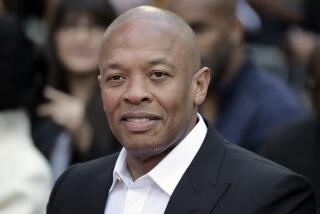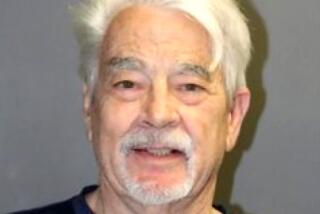Gay Community Rallies to Support Accused Therapist
- Share via
Monday was Judith M. Doyle Night at a Long Beach bar called Details.
Holding court amid rounds of hugs, Doyle--a well-known activist in this city’s gay and lesbian community--shook hands and chatted while more than 150 of her friends and supporters danced, drank and made pilgrimages with their checkbooks to a special legal defense table set up in a corner of the establishment on Broadway.
“A member of our community is being attacked,” said Michael Miner, former board chairman of One in Long Beach Inc., the city’s major social service agency for homosexuals. Doyle is executive director of the agency. “The issue isn’t whether the allegations are true or false, but that one of our own is in trouble.”
‘Grateful for Friends’
Said Doyle: “I’m just overwhelmed. I’m so grateful for my friends.”
At issue is an allegation that Doyle, a family therapist, became involved in a sexual relationship with a former client.
Doyle has admitted the sexual relationship, but testified during an administrative hearing on the matter that it did not begin until after the therapeutic relationship had ended. At stake is Doyle’s state license to practice family therapy and possibly her effectiveness as a community leader.
Besides heading One in Long Beach Inc., Doyle is a founder of the city’s annual gay pride festival and was chairwoman of last month’s successful AIDS Walk/Long Beach.
“Frankly, I don’t think it will hamper her effectiveness at all,” said Geoff McIntosh, current chairman of the One in Long Beach board, which recently gave Doyle a formal vote of confidence. “I think the community has maintained a position that (one is) innocent until proven guilty. I feel strongly that she’s been a great asset. She’s a wonderful leader and a great inspiration, and I feel nothing but admiration and support for Judy.”
The allegation against Doyle is being considered in a hearing before Los Angeles Administrative Law Judge Rosalyn M. Chapman, which opened earlier this month and after seven days, was continued to September. In addition to engendering intense interest among the city’s large homosexual population, the case has raised questions about the ethics of the therapist-client relationship.
Licensed Since 1977
The case has its roots in 1982 when Patricia A. Lamis, then an interior designer, sought Doyle’s services as a therapist. Doyle, who has been licensed by the state to practice family therapy since 1977, runs a private counseling service that includes many homosexual clients.
In the course of a year, both Doyle and Lamis testified, they met in nine formal paid counseling sessions during which they discussed issues ranging from Lamis’ failing relationship with another woman to various stresses at her job.
That is when the two accounts begin to diverge.
Doyle testified that about four months after formally ending the counseling sessions in April, 1983, Lamis initiated a sexual relationship that lasted through the end of the year. Mindful of the potential damage inherent in such a relationship, Doyle testified, she made a careful professional assessment of her former client’s state of mind to assure herself that Lamis no longer considered their relationship therapeutic. Among other things, she said, she observed Lamis’ behavior toward her and discussed with her the fact that any romantic involvement between the two would preclude future therapy.
Lamis, on the other hand, testified that she always considered Doyle her therapist, even after their formal therapy sessions had ended. And in a civil suit filed in 1986, as well as in a complaint to the state Board of Behavioral Science Examiners, which licenses family therapists, she said that her sexual involvement with Doyle caused great emotional pain and confusion which, among other things, made it impossible for her to continue her career and contributed to her current unemployment.
After listening to both sides, Judge Chapman will have at least 30 days to issue an opinion on whether Doyle’s license should be revoked by the board. The civil suit is pending.
Some Disagreement on Ban
Although experts say that most family therapists believe it is unethical to engage in sexual relations with clients during the period in which the clients are undergoing therapy, there is some disagreement over the extent to which that ban should apply to former clients.
In an interview, Mary Riemersma, executive director of the 14,000-member California Assn. of Marriage and Family Therapists, said that in the early 1980s, when Doyle and Lamis were dating, the profession’s ethical guidelines were silent on the question of just when a therapeutic relationship ends.
Subsequently, Riemersma said, legislators enacted a law that defines the length of the therapeutic relationship as two years after the termination of formal sessions. And now, she said, her association is sponsoring legislation that would make it a criminal offense for a therapist to have sex with a client up to six months after formal therapy ends.
“It is something we are very concerned about,” Riemersma said. “It is a significant problem.”
So significant, according to officials of the state Board of Behavioral Science Examiners, that the number of pending cases involving alleged sexual misconduct by California therapists has risen from about five in 1984 to about 100 today. While the vast majority involve male therapists accused of becoming sexually involved with female clients, said Kathleen Callanan, the board’s executive officer, a smattering of others have involved homosexual relationships.
Several Issues
It was Callanan who filed the board’s formal accusation against Doyle based on Lamis’ complaint. In recommending a resolution, lawyers on both sides say, Judge Chapman will be asked to consider several issues, including whether the therapeutic relationship was actually terminated before the sexual relationship began, whether a reasonable length of time elapsed between termination of the formal sessions and commencement of the personal relationship and whether Doyle made reasonable efforts to determine that the sexual relationship would not harm her former client.
Some members of the city’s homosexual community fear that the case could lead to negative feelings towards homosexuals.
“I think a lot of people are unhappy with the publicity,” said David Newell, president of the city’s Lambda Democratic Club, a homosexually oriented political group. “Whenever any kind of accusation of lurid conduct comes out against anybody in a minority community, obviously it is going to reflect badly on that community.”
For the most part, though, the public reaction has been characterized by the kind of support evident at this week’s disco gathering, where friends who organized the event said they collected about $4,000 in donations to help defray Doyle’s legal expenses, which have already amounted to more than $10,000.
‘Willing to Speak Out’
“She is an extremely important member of the community who is willing to speak out for the community,” said JoEllen Craglione, a resident of Orange who performed with a group of clog dancers at the fund-raising event. “I hope she sees the support that she has.”
Said Paul F. Cole, a friend who also happens to be a licensed clinical social worker: “What happened to Judy could happen to any of us. I really love her and I’m sure she never intended to hurt anybody. She is a wonderful example of someone who has given her heart and soul to the gay community; she’s one of our best.”
Although Doyle’s position as the executive director of One in Long Beach Inc., is in no immediate jeopardy, board chairman McIntosh said, the board could be forced to reassess its position should she lose her case. “We wouldn’t specifically remove her for being guilty,” he said, “although we would no doubt have to reflect on how it would affect our ability to obtain grants.”
Doyle says it is too early to tell yet whether her private practice will suffer as a result of the controversy, even if she retains her license. And although she was back on the job at One in Long Beach Inc. this week, she said the emotional strain has been great.
“It’s an incredulous experience,” Doyle said in an interview during a break at last week’s hearing. “It’s antithetical to everything I stand for. I’m just amazed.”
More to Read
Sign up for Essential California
The most important California stories and recommendations in your inbox every morning.
You may occasionally receive promotional content from the Los Angeles Times.













